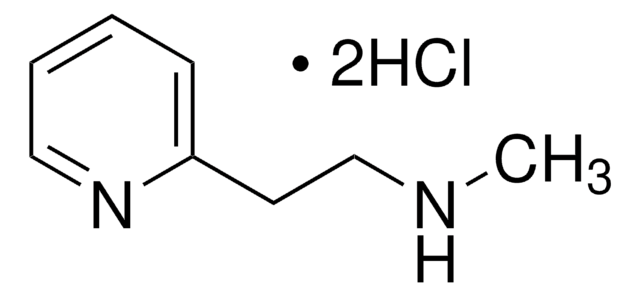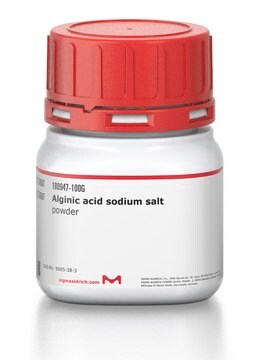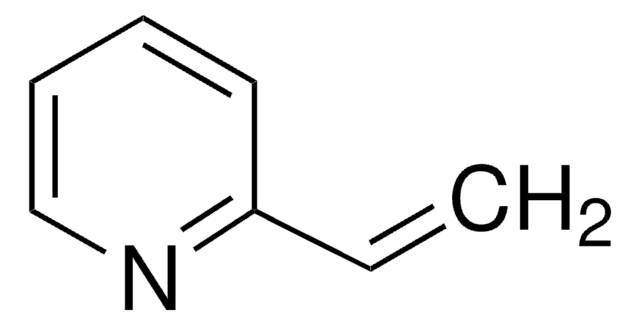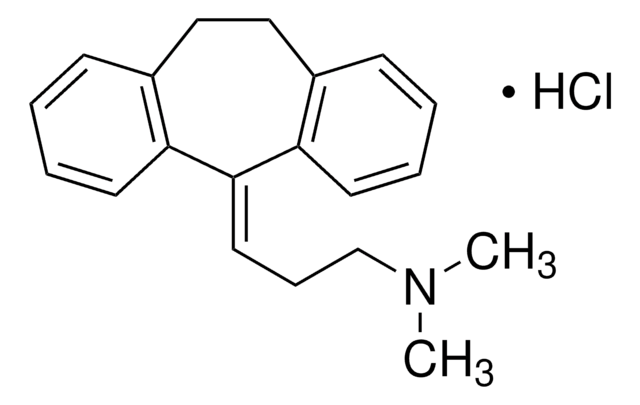B4638
Betahistine dihydrochloride
≥98%
Sinónimos:
Methyl[2-(2-pyridyl)ethyl]amine dihydrochloride
Iniciar sesiónpara Ver la Fijación de precios por contrato y de la organización
About This Item
Fórmula empírica (notación de Hill):
C8H12N2 · 2HCl
Número de CAS:
Peso molecular:
209.12
Número CE:
Número MDL:
Código UNSPSC:
12352100
ID de la sustancia en PubChem:
NACRES:
NA.22
Productos recomendados
Análisis
≥98%
formulario
powder
cadena SMILES
Cl.CNCCc1ccccn1
InChI
1S/C8H12N2.2ClH/c1-9-7-5-8-4-2-3-6-10-8;;/h2-4,6,9H,5,7H2,1H3;2*1H
Clave InChI
XVDFMHARQUBJRE-UHFFFAOYSA-N
Información sobre el gen
human ... HRH1(3269) , HRH3(11255)
¿Está buscando productos similares? Visita Guía de comparación de productos
Código de clase de almacenamiento
11 - Combustible Solids
Clase de riesgo para el agua (WGK)
WGK 3
Punto de inflamabilidad (°F)
Not applicable
Punto de inflamabilidad (°C)
Not applicable
Equipo de protección personal
Eyeshields, Gloves, type N95 (US)
Elija entre una de las versiones más recientes:
¿Ya tiene este producto?
Encuentre la documentación para los productos que ha comprado recientemente en la Biblioteca de documentos.
Los clientes también vieron
Enis Alpin Guneri et al.
Otolaryngology--head and neck surgery : official journal of American Academy of Otolaryngology-Head and Neck Surgery, 146(1), 104-108 (2011-08-20)
The purpose of this study is to evaluate the effects of betahistine in addition to Epley maneuver on the quality of life of patients with posterior semicircular canal benign paroxysmal positional vertigo (BPPV) of the canalithiasis type. Double-blind, randomized, controlled
Burkhard Franz et al.
Acta oto-laryngologica, 131(11), 1155-1159 (2011-09-13)
Betahistine dihydrochloride, a drug used widely in the systemic treatment of balance disorders such as Ménière's disease, was found to improve eustachian tube function when applied topically in the nasopharynx of rats. The study tested the effect of betahistine, a
T Y Kew et al.
The Journal of laryngology and otology, 126(1), 66-71 (2011-08-27)
We report an extremely rare case of duplication of the internal auditory canal associated with dysfunction of both the facial and vestibulocochlear nerves. We also review the literature regarding the integrity of the facial and vestibulocochlear nerves in such cases.
Maurício Malavasi Ganança et al.
Brazilian journal of otorhinolaryngology, 77(4), 499-503 (2011-08-24)
Betahistine is a medicine used to treat vestibular disorders that has also been used to treat tinnitus. To assess the effects of betahistine on tinnitus in patients with vestibular disorders. Retrospective data were collected from patient records for individuals presenting
Fritz Ihler et al.
PloS one, 7(6), e39086-e39086 (2012-06-30)
Betahistine is a histamine H(1)-receptor agonist and H(3)-receptor antagonist that is administered to treat Menière's disease. Despite widespread use, its pharmacological mode of action has not been entirely elucidated. This study investigated the effect of betahistine on guinea pigs at
Nuestro equipo de científicos tiene experiencia en todas las áreas de investigación: Ciencias de la vida, Ciencia de los materiales, Síntesis química, Cromatografía, Analítica y muchas otras.
Póngase en contacto con el Servicio técnico







